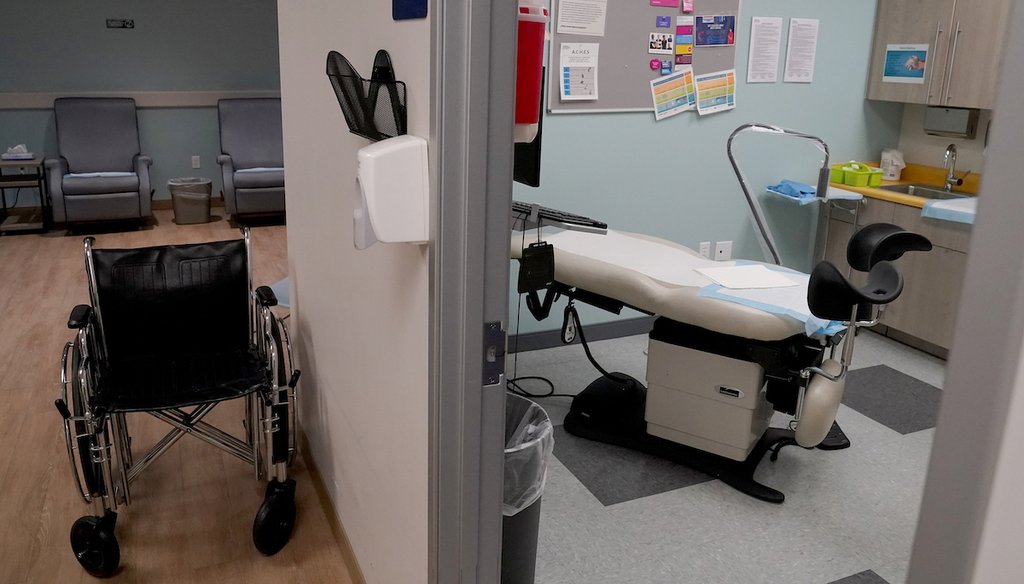Stand up for the facts!
Our only agenda is to publish the truth so you can be an informed participant in democracy.
We need your help.
I would like to contribute

An unoccupied recovery area, left, and an abortion procedure room are seen at a Planned Parenthood Arizona facility in Tempe, Ariz., on June 30, 2022. (AP)
Wisconsin’s 20-week limit on abortion access is really not ‘out of bounds’ internationally
If Your Time is short
-
Wisconsin has a 20-week time frame to obtain an abortion
-
Republican lawmakers have introduced a measure to cut that time frame from 20 to 14 weeks.
-
The majority of European countries have time frames set at 12 weeks, although there is a wide range from 24 weeks in the UK to 10 weeks in Portugal. France is at 14 weeks, as of 2022.
-
But looking outside Europe, Wisconsin is not so "out of bounds."
As election season heats up, the issue of abortion rights has moved from a simmer to a slow boil nationally as well as at the state level.
At an appearance in Waukesha County, Vice President Kamala Harris implied that abortion would be central to an election rematch between Democratic President Biden and Republican former President Donald Trump. And the issue continues to be a front burner issue in Wisconsin, as Assembly Speaker Robin Vos, R-Rochester, weighed in on an aspect of Wisconsin’s abortion law: the allowable time frame for the procedure.
"The law in Wisconsin is 20 weeks," Vos said Jan. 7, 2024 on WISN’s "UpFront." "That is way outside the international bounds. Take France as an example, they are at a 14-week allowance for abortion."`
About two weeks after the appearance, Wisconsin GOP lawmakers introduced a bill to ban abortion after 14 weeks of pregnancy except in situations where the mother's life or health would be endangered without the procedure. The measure would reduce the time frame for legal abortions by six weeks, from 20 to 14 weeks.
Milwaukee Journal Sentinel: "Kamala Harris puts abortion at center of presidential race during suburban Milwaukee rally."
The proposal puts the matter in front of voters by calling for a statewide referendum during April’s election on whether the 14-week prohibition should take effect. A few days after the bill’s introduction, Democratic Gov. Tony Evers promised to veto the measure.
Related PolitiFact: Vice President Kamala Harris says "Today in America, 1 in 3 women of reproductive age live in a state with an abortion ban."
Related PolitiFact: Mike Pence says "The fact is, today abortion law in the United States is more aligned with China and North Korea than with Western nations in Europe."
Following major criticism of the Wisconsin bill, Republican lawmakers voted to add exceptions for pregnancies that result from sexual assaults and incest.
Other Republicans, both here and nationally, have made claims similar to the one from Vos, so we decided to dig in: Is Wisconsin’s 20-week threshold "way outside international bounds?"
Allowable time frames for procedure
When asked for data to support the statement, Vos staffer Angela Joyce directed PolitiFact Wisconsin to online information, including from the UK’s Right to Life site, on allowable time frames for legal abortion procedures in European Union countries.
The EU time limits, according to the UK Right to Life listing:
10 weeks: Croatia, Cyprus, Portugal, Slovenia
11 weeks: Estonia,
12 weeks: Belgium, Bulgaria, Czech Republic, Denmark, Finland, Germany, Greece, Hungary, Ireland, Italy, Latvia, Lithuania, Luxembourg, Slovakia
14 weeks: France, Romania, Spain
18 weeks: Sweden
22-24 weeks: Netherlands
Another study of legal abortion time frames in Europe in 2020, by Jenny Yang and published by Statista on Nov. 30, 2023, found roughly the same time frame limits as did Right to Life, ranging from 10 weeks in Portugal through 24 weeks in the United Kingdom.
Note: The United Kingdom is not included in Right to Life’s EU countries listing because the UK exited the EU (Brexit) in 2020.
So, when only European Union countries are considered, Vos may generally be on target – but there is important information missing here.
According to the Center for Reproductive Rights, a global legal advocacy organization that seeks to advance reproductive rights, such as abortion, there are broad exceptions across Europe that are in place to allow for abortions after the initial gestational limit expires.
Those exceptions include concerns over mental and physical health of the woman, fetal impairment, pregnancy resulting from sexual assault or incest and socio-economic reasons. Researchers say some of the socio-economic reasons for elective abortion include marital status or lack of a supportive partner, no family support system and financial insecurity.
"Categorizing countries by their nominal gestational limits does not provide an accurate reflection of the status of legal protection for abortion," Katherine Mayall, director of strategic Initiatives, legal strategies, innovation and research at the Center for Reproductive Rights, said in an email to PolitiFact Wisconsin. "Across Europe, there are broad exceptions to abortion that are in place after the initial gestational limit expires, meaning abortion remains accessible thereafter."
Mayall also noted that in the United States in the wake of the U.S. Supreme Court ruling overturning Roe vs. Wade many states are moving to narrow access to abortion – the opposite of what is happening in many other countries.
"The overwhelming global trend has been towards the liberalization of abortion laws, with over 60 countries liberalizing their laws in the past 30 years," Mayall said. "In that same time frame, only four countries have removed legal grounds for abortion – the U.S., El Salvador, Nicaragua, and Poland."
Related PolitiFact: President Joe Biden says The Supreme Court decision overturning Roe v. Wade "made the United States an outlier among developed nations in the world" on abortion rights.
Related PolitiFact: Lindsey Graham says "We’re one of the seven nations in the world that allow abortion on demand at 20 weeks."
According to the Center for Reproductive Rights, only six European countries have highly restrictive abortion laws and do not permit abortion on request or on broad social grounds. Those countries are: Andorra, Liechtenstein, Malta, Monaco, Poland and San Marino.
"Andorra, Malta and San Marino do not allow abortion at all," the center’s report says. "Liechtenstein allows abortion only when a woman’s life or health is at risk or the pregnancy is the result of sexual assault. Monaco and Poland allow it only when a woman’s life or health is at risk, the pregnancy is the result of sexual assault or involves a severe fetal anomaly."
Global time frames
There is an even more important factor to consider – Vos said Wisconsin was "way outside the international bounds (emphasis ours)" and referenced France. But that’s only a partial view.
Internationally, at least 75 countries allow abortion on request, with varying time frame limits, with the most common being 12 weeks.
So let’s look beyond Europe.
In many countries, as is the case in the United States, abortion limits differ by state or territory. For example, take Australia, where the on request gestational limit in Victoria is nine weeks for medication abortion and 24 weeks for surgical abortion.
In New South Wales, Australia, the limit is nine weeks for a medical abortion and a surgical abortion is usually carried out between 7-12 weeks from the first day of a woman's last period. However, abortions are generally available up to 20 weeks of pregnancy, according to Family Planning Australia.
A look at a selection of other countries finds wide ranging time frame limits, including 24 weeks in Columbia.
Additional international time frame limits, in weeks, sometimes have a wide range depending on circumstances of the abortion request such as fetal impairment, mental or physical health issues, sexual assault, incest, or social-economic reasons.
Below are time frame limits for a selection of countries, some obtained from a 2017 report by the United Nations Department of Economic and Social Affairs:
Argentina – 14
Chile – 12-14
Cuba – 12
China – 14-18
Botswana – 16
Guyana – 16
India – 24
Iran – 16
Japan – 22
Kuwait – 16
Mexico – 12-20
Russia – 12-22
South Korea – 24
South Africa – 12-20
Turkey 10-20
Ukraine – 12-22
Uruguay – 12-14
Our ruling
Vos said "The law in Wisconsin (on abortion time frame limit) is 20 weeks. That is way outside the international bounds."
The number of weeks are generally on target for Europe, where most EU countries are at 12 weeks. But there are exceptions to that, with EU time frames ranging from 10 to about 22 weeks.
And when we look outside Europe, a selection of countries in Asia, Africa, Middle East and Eastern Europe, we find time frames again starting at 10 weeks and going up to 24 weeks. So, internationally Wisconsin is not so far outside the norm, as Vos claims.
In addition, even in Europe, there are many exceptions to the time frame limits which allow for abortions after the limits. And what’s more, the global trend is more toward relaxing the time limits, not tightening them – the opposite of what is happening here.
For a statement that contains an element of truth but ignores critical facts that would give a different impression, our rating is Mostly False.
Our Sources
WISN "UpFront," Robin Vos, Jan. 7, 2024, at 06:01 mark.
Email Angela Joyce, office of Robin Vos, Jan. 11, 2024.
Email Katherine Mayall, director of strategic Initiatives, legal strategies, innovation and research at the Center for Reproductive Rights, Jan. 25, 2024.
Statista "Legal abortion time frames in Europe 2020," Nov. 30, 2023.
Center for Reproductive Rights "Maps Page," accessed Feb. 5, 2024.
Milwaukee Journal Sentinel "Is abortion legal in Wisconsin? Here's how the overturning of Roe v. Wade affects Wisconsin abortion laws," June 24, 2022
WISN "UpFront", Jan. 7, 2024, at 06:01 mark.
Right to Life "What are the abortion time limits in EU countries?" accessed Jan. 24, 2024
Milwaukee Journal Sentinel "Republicans amend 14-week abortion ban measure to include rape and incest exceptions," Jan. 23, 2024.
KFF "Abortion in the United States," July 1, 2022.
Associated Press "Wisconsin Republicans introduce a bill to ban abortions after 14 weeks of pregnancy," Jan. 19, 2024.
Milwaukee Journal Sentinel "Assembly Republicans eye abortion referendum for April ballot. Evers threatens veto." Dec. 21, 2023.
Human Rights Watch "France Expands Abortion Access in Two Key Moves," March 1, 2022.
Axios, "U.S. joins only 3 other countries that have rolled back abortion rights since 1994," June 24, 2022.
Victoria State Governor Department of Health "Abortion in Victoria," accessed Feb. 5, 2024.
Family Planning Australia "Law On Abortion In NSW," accessed Feb. 5, 2024
National Public Radio "Abortion laws in Colombia are now among the most liberal in the Americas," July 13, 2022.
National Library of Medicine "Abortion in Chile," December 2019.
National Catholic Register "What Do Abortion Laws Look Like in Latin America? Here’s a Country-By-Country Map," Feb. 28, 2022
Asia Pacific Foundation of Canada "In China a fight for reproductive rights," April 21, 2023
World Health Organization "A multifaceted approach to prevent unsafe abortion," accessed Feb. 5, 2024.
IndiaSpend "24-Week Limit For Abortion Is Obsolete," Feb. 2, 2024
United Nations Department of Economic and Social Affairs "Abortion Laws and Policies – 2017. Islamic Republic of Iran,"
Milwaukee Journal Sentinel "Kamala Harris puts abortion at center of presidential race during suburban Milwaukee rally," Jan. 22, 2024
PolitiFact: Mike Pence says "The fact is, today abortion law in the United States is more aligned with China and North Korea than with Western nations in Europe." July 5, 2023.
PolitiFact: President Joe Biden says "The Supreme Court decision overturning Roe v. Wade "made the United States an outlier among developed nations in the world" on abortion rights. June 24, 2022
PolitiFact: "We’re one of the seven nations in the world that allow abortion on demand at 20 weeks," May 13, 2022.
Milwaukee Journal Sentinel "Kamala Harris puts abortion at center of presidential race during suburban Milwaukee rally," Jan. 22, 2024.
Browse the Truth-O-Meter
More by D.L. Davis
Wisconsin’s 20-week limit on abortion access is really not ‘out of bounds’ internationally
Support independent fact-checking.
Become a member!
In a world of wild talk and fake news, help us stand up for the facts.



















































